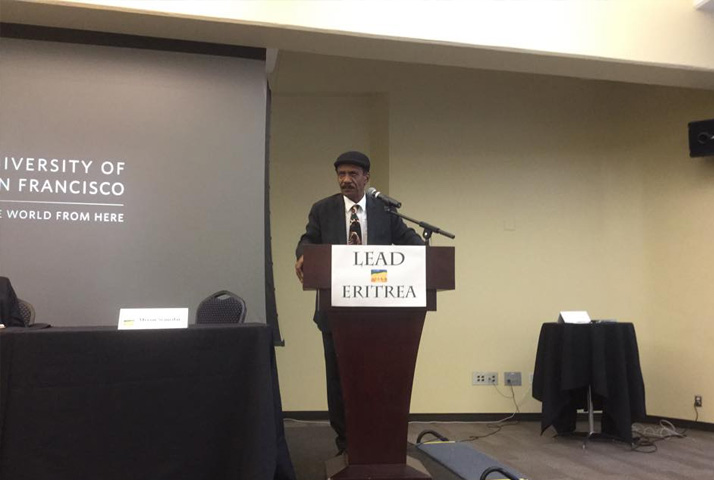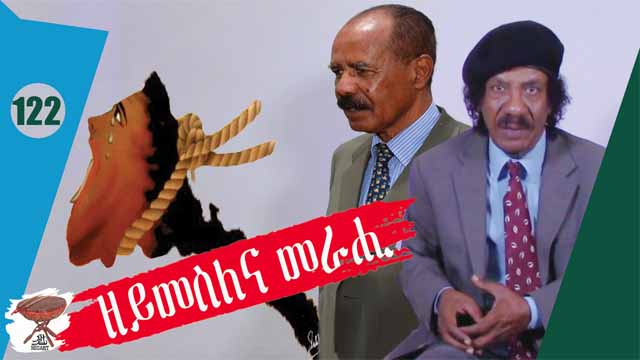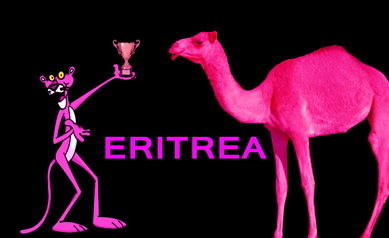Democracy: May Your Heart’s Wish Come True

On September 24, 2016, I was at the University of San Francisco to attend a discussion that was organized by the energetic Meron Samadar (Lead Eritrea). The following is the speech that I prepared but as usual, I delivered its condensed version from memory without reading it. Therefore, though I expressed the gist of the speech, I might have skipped some parts. Here is the entire speech as it was prepared.
Seyyidaati wesaadeti, asselaam w’aleikum w’rahmetullahi taala, fi haazihi almumaasaba altayeba, yusherrifni an ataHadessa ileykum….. I think I am losing some of you.
Sorry: Haysam wehaaysat, Abeekum w’noushkum, yom it’ella qedemekum… enda….
still losing some?
Okay, I would like to do it in English despite my terrible accent, or maybe I will speak in Habashi because I am Habeshi… and everybody and their friend here are Habash like me.
Dear friends, colleagues, and distinguished guests.
I have a friend who doesn’t like meetings and conversations; every time I attend such a meeting, he calls just to make sarcastic remarks: “Saleh, I hear you are going off again for a meeting, to resolve all our problems!”
He used to annoy me until recently. Lately, though, I am beginning to question if his sarcasm doesn’t carry some truth in it, particularly when he quoted George Bernard Shaw: “The single biggest problem in communication is the illusion that it has taken place.”
That remark invoked serious reflection: are our endless meetings producing anything at all, are they fruitful? How do they fare compared to the material and emotional resources that we invest in them?
I don’t have complete answers, and that is a collective task. So, help me find some.
Hopefully, our meetings are not vanity because there are many who think they are. Could we be indulging in what the Catholics call Omnia Vanitas, all vanity? We have been talking about democracy for too long we seem to forget we have to end the talking and start doing something. If democracy is ever going to be the means to achieve freedom, not an end in itself, we need to launch yet another “Gele Negber” project as some seasonally motivated Eritreans would say.
At any rate, today I will speak about “The Route to Democracy,” a title given to me by the organizers–please excuse me because I am claiming democracy has become a cliché. I think it’s a tired and overused expression. Conversely, I believe that if we internalize a fraction of the democracy that we talked about over the years, or adopted a fraction of what it embodies, maybe we could see results. If we did that, by now we wouldn’t be in search of the direction to The Route Of Democracy, we would have had an app that takes you there. Just type democracy and the GPS will do the job. That simple.
My friends can testify that I have an aversion to theories, pronouncements that are uttered to beautify empty speeches, especially pretentious speeches by people who abhor democracy, yet they pretend to believe in its tenets. But how do we know whether a speaker is saying (and doing) the right things? I have a formula (copyright) stolen from, George Bernard Shaw who said, “Beware of false knowledge; it is more dangerous than ignorance.”
Context Is The King
There is a traditional Tigrinya song that goes like this: Eza Adua Adua etbelouwa, ktmetsekum diya ketkedwa….
And here is what I am saying—I am apologizing in advance because my presentation is not an academically accepted style, but its hegereseb equivalent, “the country style” presentation that is close to my heart. I like to speak within the context of the current Eritrean struggle–politically speaking, for the last two decades I only know of one context, an Eritrea centered context. And most of us realize the situation in Eritrea is real, not imagined; it’s not something that can be solved by indulgence in academic pretensions. It is a real problem and it demands that our approach be commensurate with that reality. We need real, tangible actions that would bring a solution. Otherwise, we will endlessly wallow in lamentations: eza demokrasi demokrasi etebluwa, ketmetsakum diya ketkeduwa….
A big chunk of our problems will be solved once we agree whether to go in search of democracy or just wait for it to come to us. If we agree to end (or to decrease) the volume of our talking sessions and begin to take practical steps to remove the only hindrance that is preventing us from achieving our aspiration, and the aspiration of all freedom-loving Eritreans, it will be very simple to reach our destination—remember, we would have an app that will show us the Route to Democracy! Unfortunately, those who have older iPhones should wait for iPhone 13–maybe for iPhone9–it is that simple. But how do I know?
Eritrean pastoralists are known for their limitless patience, something that one observes in the first encounter with them. When they meet other people, their greetings will go on for eternity. They take turns asking each other long-winded questions. On the contrary, city dwellers and sedentary people are impatient, hasty, and fast-talkers. A pastoralist guiding city folks to a destination would face restless and repeated questions: “how far are we? Are we closer?” He would simple say, eh, with a nod, or pointing to the distant hills he would say, “it is just behind those hills”. But there are more hills behind the hills.
Didn’t you say it was behind the hills?
“Yes, I did, they are still behind the hills, we will get there.”
To the surprise of the restless folks, once they cross the hills, the destination seems to shift further behind the next range of hills. By the time they reach their destination, after walking for hours, they are a wreck— annoyed, frustrated and their feet blistered. Cursing the guide’s perception of time and space, they narrate their experience to whoever is willing to listen. They are not aware that in the open spaces, people neither worry of time nor space. Their attitude is ‘we will get there when we get there.” Patience.
See! The pastoralist sees the hills behind the first range of hills, the youth from the city couldn’t. Knowing what lies behind the objects that you see on the horizon is vital. If we cannot see behind a far object, we are doomed. That is why we have to learn to visualize what lurks behind the corner.
No Adua, No Demokrasi
A few days ago I listened to a lecture by the renowned and enlightened Muslim preacher, reformer, and Imam of a mosque, the Palestinian-Austrian Dr. Adnan Ibrahim (who is not popular with those who claim to be the viceroys of God, particularly the fanatic faction of the Muslim Selefi sects). He explained the difference between internal and external pivotal points (references) of a person; the following is extracted from that lecture from which I benefited greatly, but in my own perception and words:
If your pivot point is internal, within you, your conscience is clear, you can see behind the hills and walls. If your pivotal point is external, then you will lack clarity because you are looking for approvals from others. You are weary if they will reward you or not, applaud what you do or not, admire you, praise you, or not—it’s all the vanity that makes us spineless and rudderless. If we have to adjust our positions based on the expected reaction of external pivot points, we become dull, dishonest, fake, unprincipled, and mere nuisances.
I am trying hard consulting my internal pivot point, therefore, I might have veered out to avoid the cliché title. Excuse me for that.
So, now I can tell you there is a room behind that wall. Just like the pastoralist I talked about, the one who sees through the hills. The room that I don’t see is still there and I am sure of that, my certain declaration makes it as good as something I actually see. Following the same logic, I can see freedom, justice, and democracy behind all the dungeon walls, all the iron bars, and all the seas and deserts of despair. I can see not only the route to democracy but democracy itself. But first, the ruthless highway robber who is standing guard on the route to democracy, terrorizing and killing people who pass by on that route, should be removed. Equally important is to realize that, like the proverbial Adua that would not come to us, we need to go to democracy. It’s certainly not going to come to us. We need to honestly pledge to do that without forgetting the pitfalls, and the damages, of not doing it.
Winston Churchill once said, “The best argument against democracy is a five-minute conversation with the average [person].” In our case, you do not need an average person, the most refined intellectual would do it for you—we have them all around us, empowering and enabling the Eritrean tranny. They seem to rephrase De Tocqueville’s famous quote: “if we cannot get equality in liberty through democracy, let’s see equality in restraint and servitude under the PFDJ’s socialism.” I believe the context of our meeting should be Eritrea-centered. Other countries do not need our help, and that is not an isolationist position. Think about it, what can we possibly contribute to the democracy of an already democratic country? Nothing. We just need to be good citizens, pay our taxes, abide by the laws, and respect the constitution—we must also be compassionate to our fellow citizens, be productive members of our communities—and maybe some of us would want to amass as much money as they can, and get education in order to amass more money easily. But beware, that is not a cartoonish depiction. Not at all. I am saying, we should stop being schizophrenic beneficiaries of democracy in our adopted homes, and at the same time insist on denying the same benefits to Eritreans at home. Sadly, we witness that in the behaviors and activities of a bunch of us working hard to sustain the power of the cruel masters to continue ruling Eritreans indefinitely. Worse, how many times have you heard a hyphenated-Eritrean, the type we know, boasting, “I am an American, I have rights,” arguing with an authority, a law enforcer or the like, just a few years after being naturalized, and after a few years of living in the West
Incidentally, we had Trump disciples in our neighborhood long before the Trump phenomenon. Please, I urge you to remember how many times have you heard same lately naturalized person talking about Eritreans and questioning their Eritrean citizenship, even if their parents, maybe their great-great parents were born, lived and were buried in Eritrean? How many times have you heard “so and so is Agame. So and so is Amharai, etc.?” How many times have you heard “nativists” brag about their seven-generation credentials in Eritrea, a claim they can never prove in a country that hardly kept birth, marriage, and death certificates and records? Pray tell me, why would I let such a person lecture me about democracy? Or, how would I have the nerve to utter the word ‘democracy’ if I am walking with one of those stone-age brain inside my skull?
May Your Heart’s Wish Come True
If I read this speech to a common Eritrean farmer, or a nomad, in any corner of Eritrea, and if any of them would understand half of it, I would consider my message properly delivered. But my guess is that they can’t understand it; instead, they would be bored to death by my blubbering.
Understandably, you might ask: Not all people are supposed to comprehend every theory or concept. I agree. Common Eritreans don’t understand our high nosed language and discourse, but we understand their language, fully. Now, do we fine-tune our message to the language they understand or sit aloof and speak in a language alien to them? I would rather speak the language of the people I wish to serve, or claim to be struggling to save.
Speaking the language of the common person requires adherence to simplicity, no GPS. Of course, the textbook definition of democracy and its boring Greek origin is not simple enough as some think–the Greeks did this and that, or, the tired description, “Demos” means a type of a citizen, and “Kratos” means “Rule.” We have been hearing that since we were teenagers, yet, it didn’t make us true democrats, not even simply democrats, true of fake. That applies to the generation before me, my generation, and the young generation of today. We all failed to place Eritrea even on the first rungs of the democracy ladder. And we will fail more if we do not learn to diligently critique our society with the intention of reforming it, we are doomed—not everything should be propaganda or politically correct. Simply put, motivational, bold, scathing criticism of our society might shake our conscience, and we should scrutinize our cultures, traditions, national attitudes, behaviors, and our general way of lives. We should put all of that under the microscope and then diagnose out problems truthfully, honestly, and at the same time responsibly. The secret is, such criticisms should not be spiteful. The intention should be to correct, reform and straighten, not to demoralize Eritreans by attacking their self-confidence. To me, that is a red line.
Wouldn’t you agree that a JUST society is by definition a democratic society? Wouldn’t you agree that a free society is a stable society? Or that a stable society is a prosperous society? Then, what follows is, we have to work for justice; without justice, the democracy whose elusive direction we are trying to find is not there, it is an illusion. It’s neither behind the hills nor behind the walls. Needless to say, any quest of our dreams would begin with the removal of the hindrance that is an embodiment of the highway robber who is lurking on the side of the route.
When I was writing this speech, I was imagining myself talking to common Eritreans (the supposed beneficiaries of our activism) promising them that our struggle will bring them democracy! Then I imagined seeing their uninterested facial expressions until a woman said to me: “hasab lbbkhum yesmrelkum”, May your heart’s wish come true.
Now, that is a profound expression whose equivalent I have not come across in any other language that I am aware of. And I doubt common Eritreans understand that democracy means many things beyond elections, though they know a lot about elections even if their mechanism may be a little different: they already know how to elect their elders to administer their villages, their young to protect the society, and their acclaimed wise men to legislate and rule. It is a culture of taking initiative and leading when the situation requires it. Apart from that, their one-liner response that reflects their attitude towards the promise of bringing democracy to them would be: May your heart’s wish come true.
Ladies and gentlemen, that is the dilemma of our democracy. Unless we internalize its values and reflect it in our behaviors, our attitude and our daily life, it is nothing but an empty rhetoric, clichés that we utter without thinking about them, just like the greeting of a nomad (though in their case, lexical and conceptual semantics can offer an explanation). If we just shadow someone, stalk him, say, for a day, we might not discover whether he is democrat or not, but we will most likely discover whether he is a JUST and fair person or not. And it’s an oxymoron for an unjust person to claim he respects democratic values. Fortunately, there is a litmus test: demonstrate in action that you are struggling to end the tyrannical rule in Eritrea and usher justice. Show everybody you are determined to remove that highway robber standing on the route to democracy, nay, to justice.
Thank you



Awate Forum